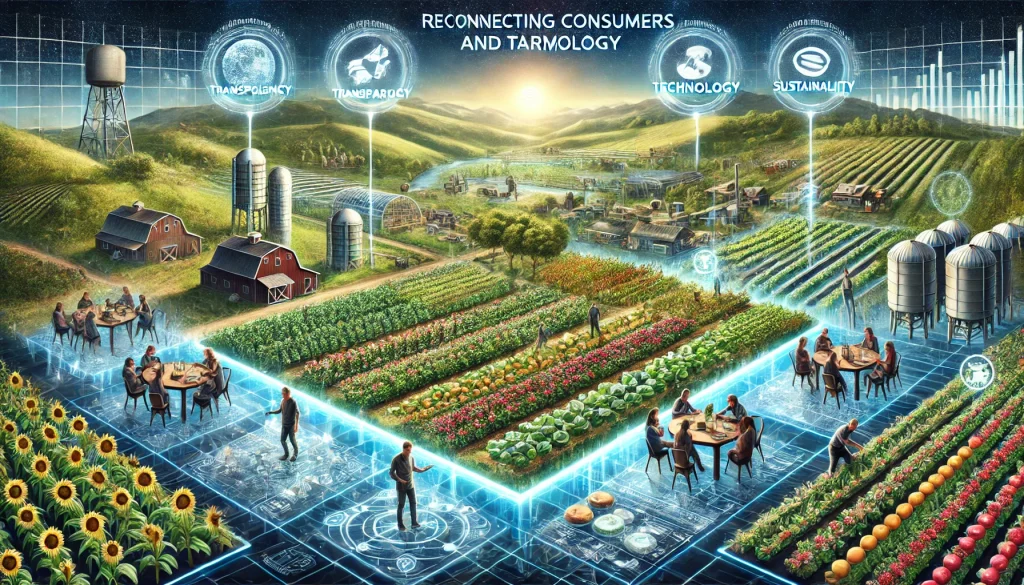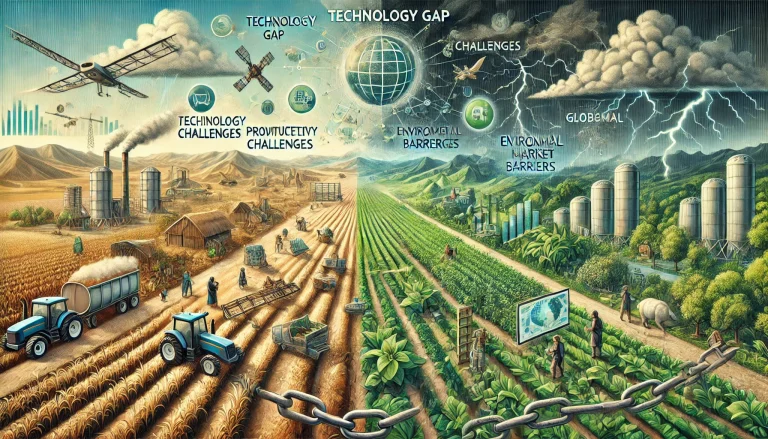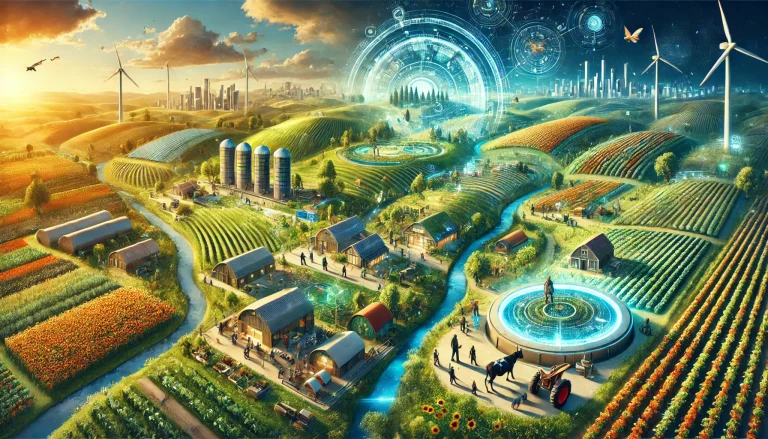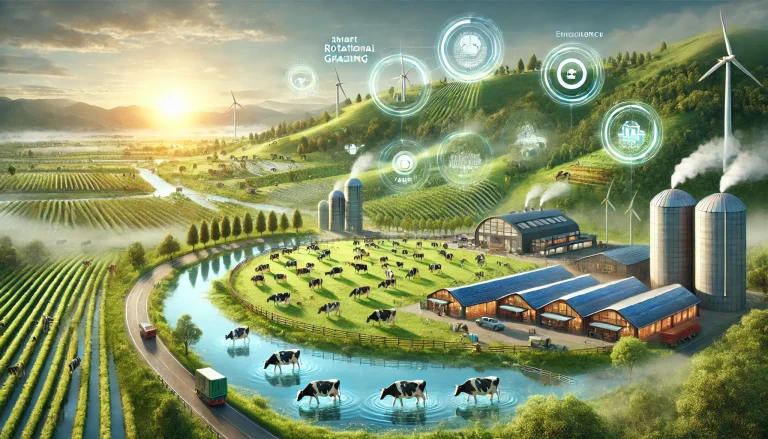Problem Statement:
In many parts of the world, there is a growing disconnect between consumers and the farmers who produce their food. This gap has widened due to the industrialization of agriculture, the globalization of food supply chains, and the urbanization of society. As people become increasingly distanced from the origins of their food, they often lose sight of the challenges that farmers face, including the pressures of fluctuating markets, environmental changes, and the rising costs of production. This disconnect can lead to a lack of appreciation for the hard work and dedication required to produce the food that ends up on consumers’ plates. Furthermore, when consumers are removed from the realities of food production, they are less likely to make informed choices that support sustainable and ethical farming practices. This situation also prevents farmers from receiving direct feedback from consumers, limiting their ability to adapt to changing preferences and market demands. The result is a food system that is often unsustainable, inequitable, and disconnected from the people it serves. Bridging this gap is crucial for fostering a more resilient, transparent, and fair food system, where consumers understand and value the efforts of farmers, and where farmers can thrive economically while practicing sustainable agriculture.
Pain Points:
- Lack of Consumer Awareness: Many consumers are unaware of the challenges farmers face, leading to a lack of appreciation for their work.
- Disconnected Supply Chains: The complexity of modern food supply chains distances consumers from the origins of their food.
- Limited Consumer Influence: Farmers have little opportunity to receive direct feedback from consumers, hindering their ability to adapt to market trends.
- Unsustainable Consumer Choices: Without a connection to farmers, consumers may make choices that do not support sustainable farming practices.
- Economic Pressures on Farmers: Farmers struggle to remain financially viable due to market pressures and low profit margins.
- Lack of Transparency: Consumers often have limited visibility into the farming practices and conditions under which their food is produced.
- Cultural Disconnect: Urbanization and the decline of farming communities contribute to a cultural gap between consumers and farmers.
- Limited Access to Local Produce: Consumers may find it difficult to access fresh, locally produced food due to distribution challenges.
- Misinformation: The disconnect between consumers and farmers can lead to the spread of misinformation about food production and farming practices.
- Decreased Support for Small Farms: As consumers become more disconnected from the realities of farming, small and family-owned farms may struggle to survive.
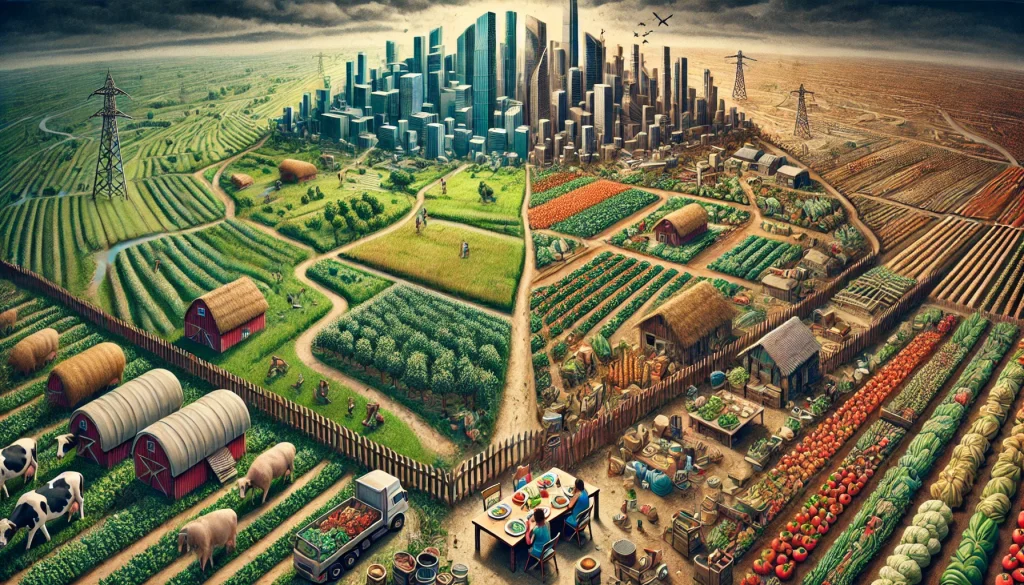
Future Vision:
The future of a sustainable and equitable food system depends on reconnecting consumers with the farmers who produce their food. This vision includes the development of a digital platform that serves as a bridge between consumers and farmers, fostering transparency, education, and direct communication. The platform would allow consumers to trace the origins of their food, learn about the farming practices used, and understand the challenges farmers face in producing their crops. By providing detailed information about where and how food is grown, the platform would empower consumers to make informed choices that support sustainable and ethical farming practices. In addition to educational content, the platform would facilitate direct communication between consumers and farmers, allowing for real-time feedback and fostering a sense of community. Farmers would benefit from increased visibility and direct access to a market of consumers who value their efforts and are willing to pay fair prices for sustainably produced food. The platform would also promote the sale of locally produced food, supporting regional economies and reducing the environmental impact of long-distance transportation. By fostering a closer relationship between consumers and farmers, the platform would contribute to a more resilient food system, where both parties work together to ensure the long-term sustainability of agriculture.
Use Cases:
- Farm-to-Table Tracking: Consumers use the platform to trace the origins of their food, learning about the specific farms and practices involved.
- Direct Communication: Consumers and farmers communicate directly through the platform, allowing for feedback and relationship building.
- Sustainable Shopping Guides: The platform offers resources and recommendations for consumers to make sustainable and ethical food choices.
- Local Food Marketplaces: Consumers purchase locally produced food directly from farmers, supporting regional agriculture and reducing food miles.
- Educational Content: The platform provides educational materials on sustainable farming practices, the importance of biodiversity, and the challenges farmers face.
- Virtual Farm Tours: Consumers can take virtual tours of farms to better understand the farming process and connect with the people who grow their food.
- Farmer Profiles: Farmers create profiles on the platform, sharing their stories, practices, and the crops they produce.
- Seasonal Produce Alerts: The platform notifies consumers when certain crops are in season and available from local farms.
- Crowdsourced Support: Consumers can contribute to crowdfunding campaigns for farm projects, supporting sustainability initiatives.
- Transparency Labels: The platform offers labels that indicate the transparency of food products, helping consumers make informed choices.
Target Users and Stakeholders:
Target Users:
- Consumers interested in sustainable and ethical food choices.
- Farmers seeking to connect directly with consumers and increase visibility.
- Agricultural cooperatives and organizations promoting local food systems.
Stakeholders:
- Food retailers and marketplaces looking to enhance transparency and sustainability in their supply chains.
- NGOs focused on food security, sustainability, and rural development.
- Government agencies regulating food safety, sustainability, and consumer protection.
- Technology companies developing digital platforms for food traceability and transparency.
- Educators and institutions promoting food literacy and sustainability.
Key Competition:
- Farmigo: A platform that connects consumers directly with local farms for fresh produce deliveries.
- Crowd Cow: Focuses on transparency and sustainability by connecting consumers with ethically produced meat directly from farmers.
- LocalHarvest: An online directory of farms and farmers markets, helping consumers find local produce and farm products.
- Good Eggs: An online marketplace that connects consumers with local and sustainably produced food, focusing on transparency.
- Barnraiser: A crowdfunding platform that helps farmers and food producers raise funds for sustainable agriculture projects.
Products/Services:
- Food Traceability Tools: Digital tools that allow consumers to trace the origins of their food and learn about the farming practices used.
- Consumer-Farmer Communication Platform: A digital platform that facilitates direct communication and feedback between consumers and farmers.
- Sustainable Food Shopping Guides: Resources and recommendations for consumers to make ethical and sustainable food choices.
- Local Food Marketplaces: Online platforms that connect consumers with local farmers and producers, promoting regional food systems.
- Educational Content and Virtual Tours: Materials and experiences that educate consumers about sustainable farming and the challenges faced by farmers.
- Farmer Profiles and Transparency Labels: Tools that allow farmers to share their stories and practices, and provide consumers with transparency indicators.
Active Startups:
- Trace Genomics: Provides soil health data and traceability solutions to ensure sustainable farming practices are used.
- GrowUp Urban Farms: Focuses on urban agriculture, connecting consumers with locally grown produce from sustainable urban farms.
- Agrilyst: Offers a platform for farmers to optimize their practices and share their stories with consumers, promoting transparency.
- Full Harvest: Reduces food waste by connecting farms with surplus produce to businesses and consumers who value sustainability.
- Ripe.io: Uses blockchain technology to create transparent food supply chains, allowing consumers to trace their food from farm to table.
Ongoing Work in Related Areas:
- Research on food traceability systems that enhance transparency and consumer trust in food supply chains.
- Development of blockchain technology for creating immutable records of food origins and farming practices.
- Consumer education initiatives aimed at increasing awareness of sustainable and ethical food choices.
- Local food movement advocacy promoting the benefits of buying local and supporting regional agriculture.
- Crowdfunding platforms for sustainable farming that connect consumers with projects focused on environmental and social sustainability.
Recent Investment:
- $150 million investment in Ripe.io in 2023 to expand their blockchain-based food traceability platform.
- $100 million raised by Full Harvest in 2022 to scale their platform for reducing food waste and connecting consumers with surplus produce.
- $75 million in funding for Trace Genomics in 2023 to enhance their soil health and traceability solutions.
- $50 million in venture capital for GrowUp Urban Farms in 2024 to develop sustainable urban farming initiatives.
- $35 million invested in Agrilyst in 2023 to support their platform for optimizing farming practices and promoting transparency.
Market Maturity:
The market for platforms that reconnect consumers with farmers is steadily maturing, driven by increasing consumer demand for transparency, sustainability, and ethical food choices. The rise of the farm-to-table movement, along with growing concerns about food safety, environmental impact, and social equity, has led to increased interest in food traceability and direct-to-consumer models. Investments in food traceability technologies, local food marketplaces, and consumer education platforms are on the rise, reflecting the growing recognition of the importance of reconnecting consumers with the origins of their food. Governments and NGOs are also playing a role in promoting food transparency and supporting local food systems. However, challenges remain in scaling these platforms and reaching a broader audience, particularly in regions where consumers are less engaged with sustainability issues. As the market continues to mature, we can expect further innovation in food traceability, greater consumer awareness, and stronger connections between consumers and the farmers who produce their food.
Summary:
The disconnect between consumers and farmers is a growing challenge in the modern food system, leading to a lack of appreciation for the hard work and challenges faced by farmers, and resulting in less informed consumer choices. To bridge this gap, there is a need for a digital platform that reconnects consumers with the origins of their food, providing transparency, education, and direct communication between consumers and farmers. This platform would empower consumers to make sustainable and ethical food choices while supporting farmers who practice sustainable agriculture. As the market for food traceability and direct-to-consumer platforms matures, there is a significant opportunity to transform the food system into one that is more transparent, equitable, and sustainable. By fostering closer relationships between consumers and farmers, we can build a more resilient and just food system for the future.
